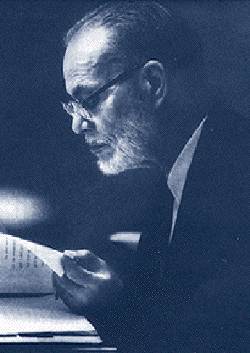 By Yasser Latif Hamdani
By Yasser Latif Hamdani
Last week (February 6) marked the 114th Birthday of one of Pakistan’s greatest unsung heroes. Once again, there was no mention of commemoration of his remarkable like. No sense of gratitude from a nation for which he did so much. He has been wiped out of our memory because he was an Ahmadi, despite his glorious contributions to Pakistan and its cause (see related post on Dr. Abdul Salam).
Sir Zafrullah Khan’s services rendered to Muslims of India, Pakistan and the Third World are second only to that of Quaid-e-Azam Mahomed Ali Jinnah. As a jurist, a diplomat and a patriot he stood head and shoulders above the lesser men who have made a mockery of our republic.
Born in 1893 in Sialkot in what was to become one of the earliest Ahmaddiya households, this small town boy rose to be one of the shrewdest legal minds of his time. His early education was in Sialkot, after which he proceeded to Lahore for his bachelors degree, under the tutelage of none other than the great Iqbal himself. He got his law degree from King’s College London in 1914, where he stood top of his class and was the first person from the Indian subcontinent to do so. He was, like most great figures of that time, called to bar at Lincoln’s Inn.
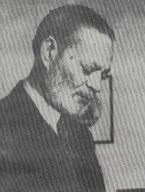
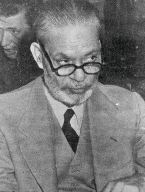
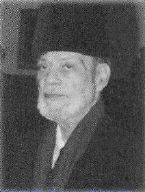


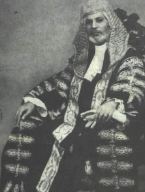
As a practicing lawyer, he soon proved his mettle and had many reported cases to his name. The first major politician to recognize Zafrullah’s talents was Sir Fazli Hussain, the founder of Unionist Party of Punjab. Starting his career in his early 30s as a member of the Punjab legislative Council, he rose to prominence as an indefatigable crusader for Muslims of Punjab. Later he represented the Muslims at round table conference and crossed swords with figures like Jinnah and Gandhi. In 1931, he became the Muslim League president and at the roundtable conference, he cornered no less a person than Churchill in a committee hearing who was forced to accept Zafrullah’s point of view.
Later he was offered a seat on Viceroy’s permanent Council, which he took to further his cause. He also served at varying times as the minister of Railways, Public works, labour and law under the Viceroy. For a brief period, he also became British India’s representative to the League of Nations, just before it was dissolved.
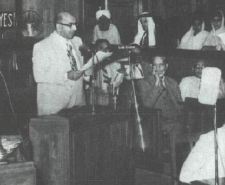
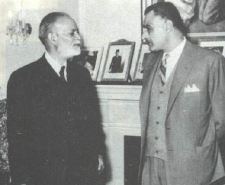
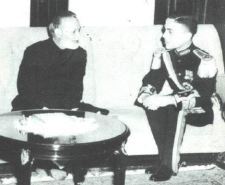
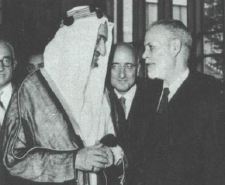
![]()
However his greatest contribution came when he drafted the famous Lahore Resolution, which till this day is the rallying point of Pakistan and Pakistani nationalism. He had been tasked with finding a common point between the popular demand for “Pakistan” and Muslim League’s all India requirements. The Lahore resolution was a broad based solution which left the door virtually open for several solutions and negotiation on the issue of partition. In essence it envisaged 2 or 3 great republics for the Muslim peoples and it was this document which forms the basis not just of Pakistan but also of Bangladesh. For this he got a lot of slack. No less a person than Khan Abdul Wali Khan highlighted Zafrullah’s religious belief to play on the popular conspiracy theory that holds Ahmadis to be British touts.
Later from 1942 onwards, he served as a federal judge (equivalent of an Supreme court C judge) of India and finally took leave on the eve of Pakistan to serve the cause of Pakistan before the Radcliffe Commission, on Jinnah’s personal request. On 25th December 1947, Jinnah appointed him the Foreign Minister of Pakistan. At the UN, Sir Zafrullah emerged as the most eloquent advocate of all third world and Islamic issues. It was Zafrullah whose efforts materialized into the UN Resolutions on Kashmir, which are the basis of the Pakistani case and grievance. Later he became the first Asian president of the International Court of Justice, a singular and unique honor for any Pakistani. He also served, briefly, as the President of the UN General Assembly. He passed away in September of 1983 in Lahore.
A prolific author on the history of Pakistan and Islam, his most famous book was titled “Agony of Pakistan” in which he makes plain the great betrayal which wrested the country from the hands of its patriots into the hands of those who were its greatest enemies. Ironically, today Jinnah’s most trusted lieutenant is not even remembered by the state which owes him so much, including its own founding document. It is the memory of people like Zafrullah Khan that will keep alive the original idea of Pakistan and there is no doubt that one day the posterity will reclaim its true destiny as a progressive and modern republic.
Yasser Latif Hamdani is a lawyer in Lahore and a researcher of the history of the Pakistan Movement.



















































We may differ with his religious beliefs but Sir Zafrullah Khan’s contribution in the Pakistan movements and Kasmir cuase can not be ignored.
However on an entirely differnt note, I would like to quote Mrs. Albright, the “Madam Secretary”.
In her book The Mighty and The Almighty, publisher Harper Collins, Chapter 8: Learning About Islam, pages 110-111 Madeleine Albright, former secretary of state writes:
“When I was ten, my father had served as chairman of a UN commission on India and Pakistan charged with resolving the status of Kashmir……….There were not many Muslims in Denver, where i spent my teenage years. My father had made contacts while at the UN, however, and some of his acquaintances came to visit. One I remember particularly was Sir Zafrullah Khan, a former foreign minister of Pakistan. I liked him because he was dignified,, erudite, and charming. When he took me to breakfast one day, my envious classmates jokingly pointed out that he could choose a second wife while keeping his first. What impressed me in talking to him about Kasmir, however, was how complicated life could be when a dispute is fueled by both religion and nationalism and each side is convinced that it has sole possession of the truth.
Sitting in the State Department many years later, I thought of Zafrullah Khan and how out of place he had seemed in Denver…..”
Mubashir
Hamburg
Here is a small extract from the summary record of Zafrulla Khan’s statement during the General Debate of the UN General Assembly sometime in October/November 1948â€
By the way, I do think he is mntioned in the text books etc. as the first forien minister of Pakistan. I also think I remember a stamp issued about him as part of the freedom leader series many years ago.
From the facts given here, I too find the notion that Sir Zafarullah’s contribution was second only to the Quaid’s to be a little exagerated. But this is a matter of opinion. However, whether second or not, anyone who drafts the Lahore Declaration is a MAJOR figure and we have been guilty of ignoring him simply because of his faith. He is not the only one we have done this to and that is our shame. His achievements, as recounted here, are great and he deserves our respect irrespective of his beliefs which should have nothing to do with his work.
King faisal,
With all due respect the only hyperbole here is what you have written. Zafrullah Khan was not a Muslim Leaguer or a career politician… he was a judge. Hence he could not hold office…
However, Jinnah papers are full of references to Sir Zafrullah Khan’s high calibre and it was for this reason that Jinnah forced Nawab of Bhopal to release Zafrullah Khan from his services and give him to Pakistan… And most important of all, Jinnah chose Zafrullah Khan as the lawyer to appear before the Radcliffe Commission. Why- may I ask- did Jinnah not appoint Liaqat Ali Khan to do the needful.
Jamaat Ahmaddiya’s contributions to Pakistan Movement were much greater than any Mullahs that you seem to praise and any Mullahs who have the nerve to abuse Quaid-e-Azam today… it was the orders of the top leadership that made Ahmadis vote enmasse for the League… even though, they must have known the fate that awaited them at the hands of the intolerant bigots that we turned out to be… so accept that other than the communists, the only other body in India to actually support Muslim League as an organisation was the Jamat Ahmaddiya. These are undeniable facts of history… you may try again and again, but educated people will need only to go through the 5 volumes of Jinnah Papers from that era to see the truth.
Here are some links you might want to read to expand the narrow annals of your mind:
“Spate started his paper with a revelation: “I was employed as a technical advisor by a Muslim group, the Ahmadiyya community of Qadian in Gurdaspur District; to them I owe an invaluable professional experience and much personal kindness. It is a sign of their efficiency and intelligence that, of those connected with the affair, they alone showed any appreciation of the fact that a geographer might have something of value to say. I found myself acting in effect as an unofficial adviser to the Muslim League and considered myself…perhaps on an inadequate ground…as an expert witness…once given Pakistan (an important qualification), the Muslim case seemed to me entirely legitimate”
Lecture to Royal Geographical society
1. http://www.dawn.com/weekly/dmag/archive/030309/dma g1.htm
2. http://www.dawn.com/weekly/dmag/archive/030316/dma g2.htm
3. http://www.dawn.com/weekly/dmag/archive/030323/dma g21.htm
Read and weep…